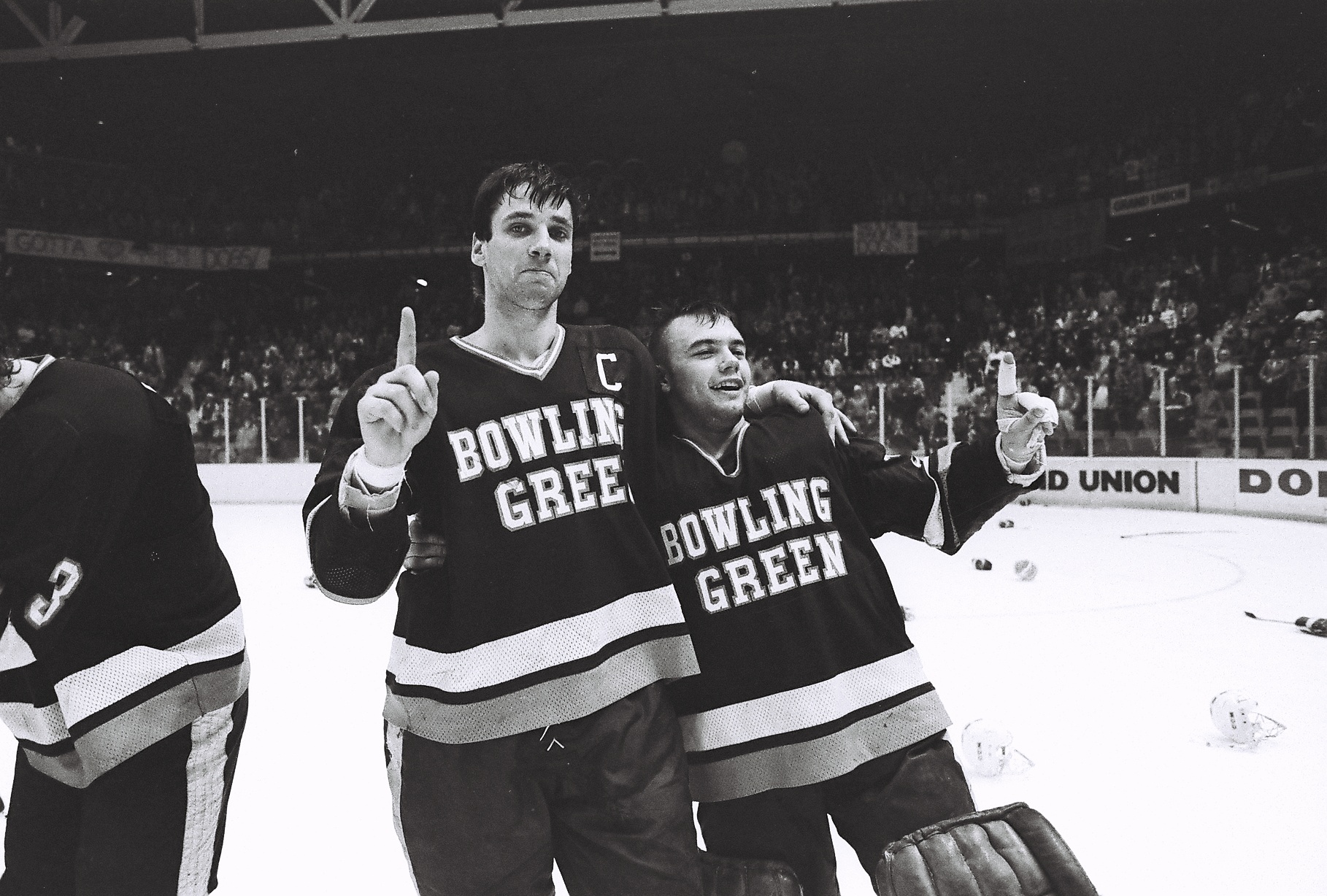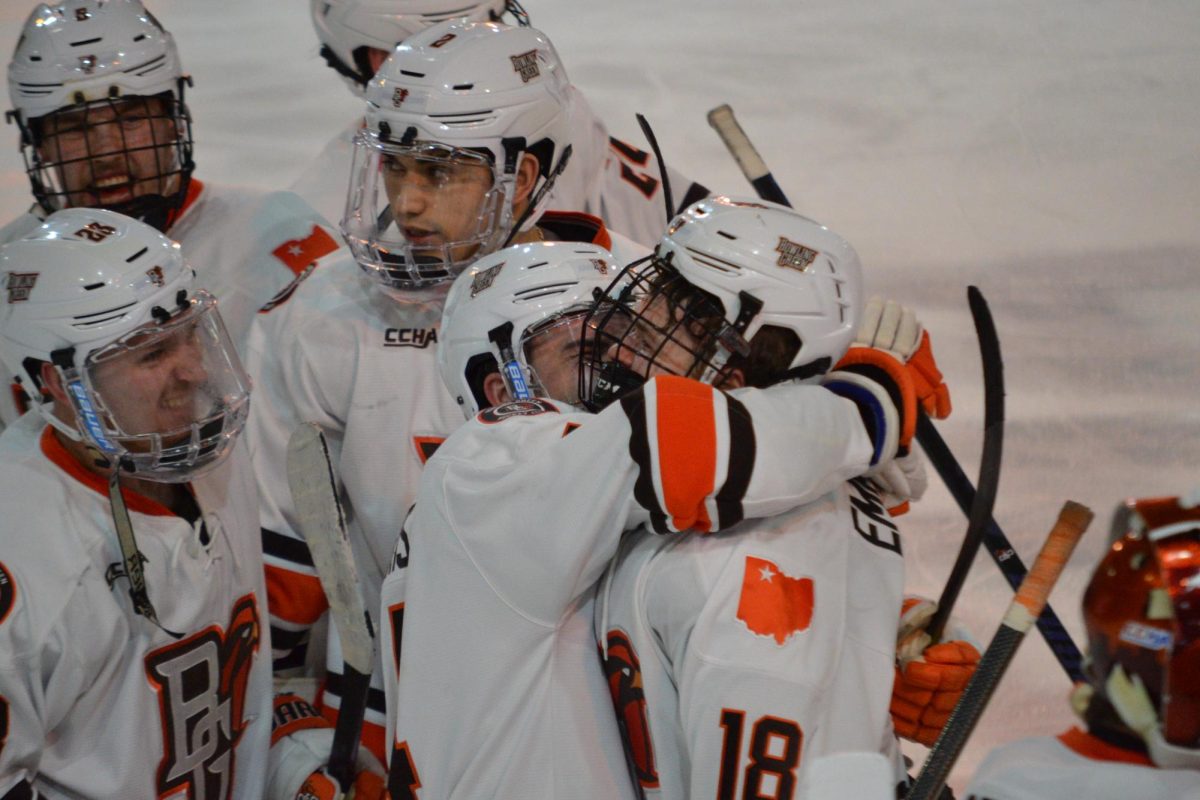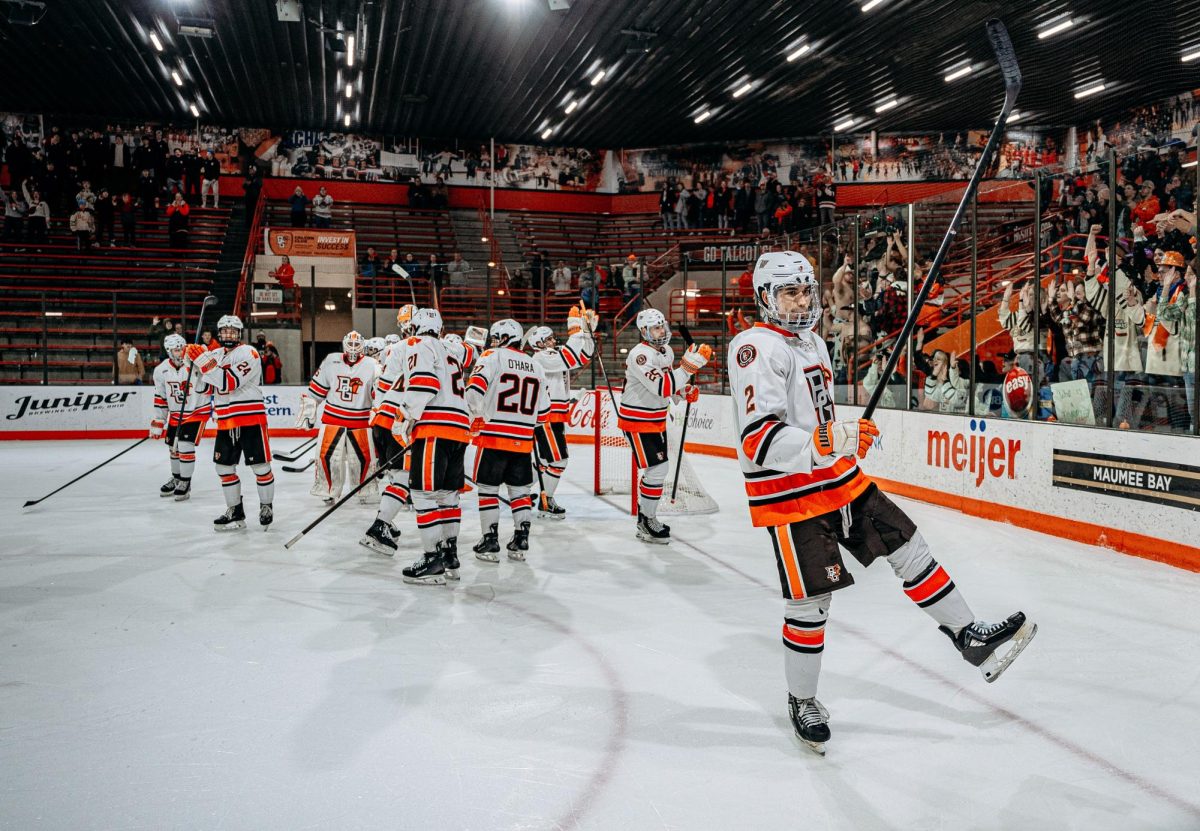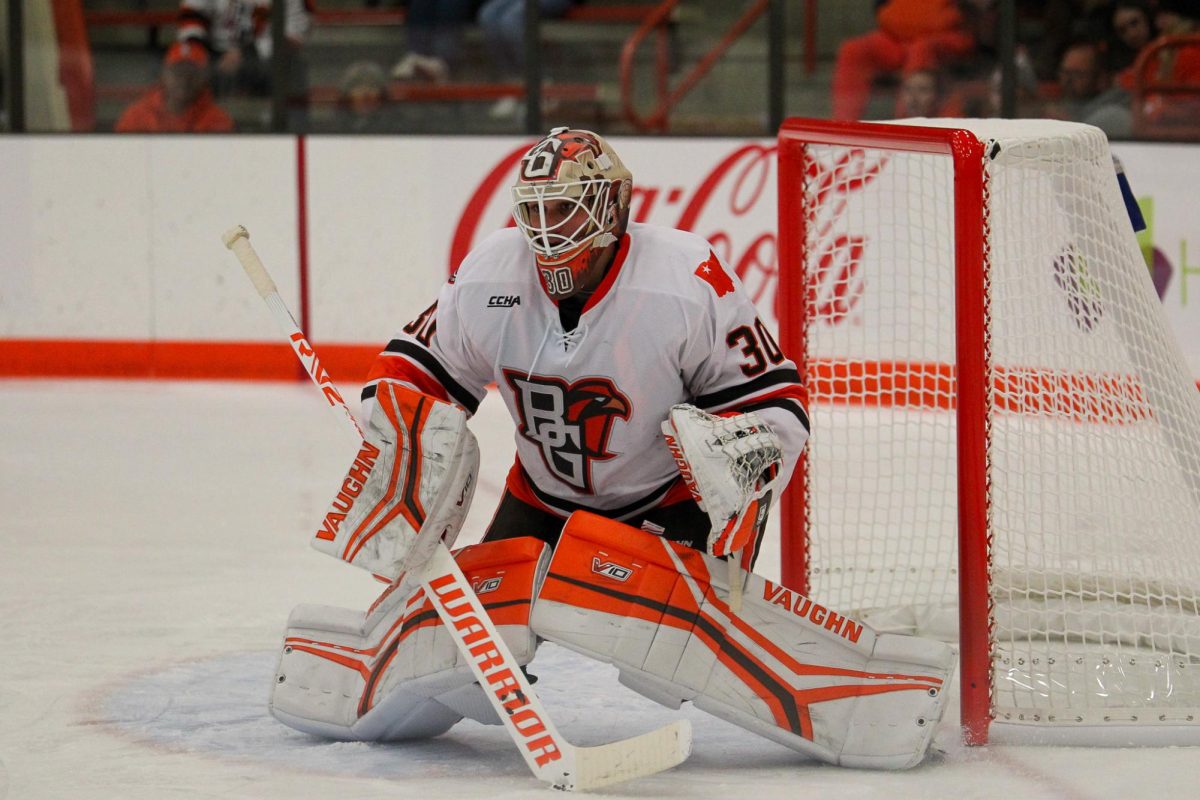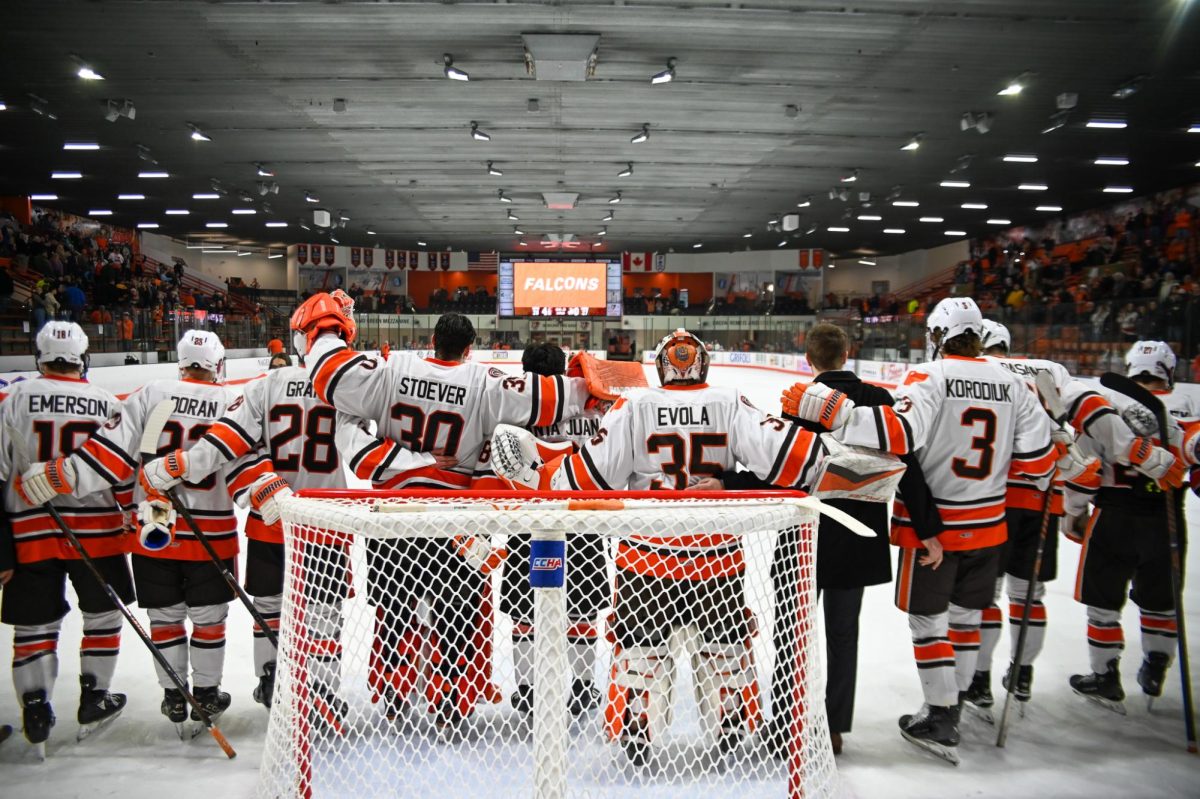The 1984 national championship was truly a highlight in the careers and lives of nearly every player and coach on the Bowling Green hockey team.
For many players, it sparked the ignition of an NHL or other pro-hockey career.
Others, it marked the culmination of great careers and the blessing to play the game they loved.
Meanwhile for future players, it was a platform of recruiting and a marquee that brought talent and more notoriety to an already sterling program.
Four decades later, these men are still ecstatic to talk about their once-in-a-lifetime experiences. Like the fans and media members, the players and coaches remember the season and the games like it was yesterday and spoke about them with heartfelt admiration.
WHY BG?
Every Falcon has their “Why BG?” reason. While much more unique in the case of players and coaches, the answers have great similarities between them.
“We came to a game at BG, and this arena kind of draws you in,” said captain and forward Mike Pikul. “We played Northern Michigan, the place was very full, and it was loud as all get out. This was the place to be.”
“I was a local kid,” said goaltender Eddie Powers. “I was asked to try it out by Coach (Jerry) York, and I just did. I knew the energy of the program and I wanted to be a part of it.”
Even in a small town, Bowling Green had a great influence outside of the state and outside of the country.
“I wanted to go to a school where hockey was number one, and that was Bowling Green,” said 1984 freshman Iain Duncan. “Out of the different choices I had, I chose one close to my hometown of Toronto and a place where hockey was king.”
A fellow Canadian, Dan Kane had a similar story about his experience deciding with future teammate and friend, Garry Galley.
“The BG guys came to scout Garry Galley and saw me play against him. They invited us both out to the campus and we walked around together and did our visit. On the way home on the plane we looked at each other and we said ‘That’s it. I’m going to Bowling Green.’”
Even York was enamored by Bowling Green campus and facilities.
“I was impressed when I came here with Clarkson and everything about Bowling Green made an impression on me.”
CHIP ON OUR SHOULDER
In the 1982-83 season, the Falcons were not given a bid into the NCAA tournament despite completing arguably the best season of the program’s history. This snub fired up the Falcons, setting up another great season the year after in which they sent a message.
“We were very surprised we didn’t make the selection,” said York. “That year we might have had a better team than we did the year after. We came out to show people that we were deserving of it the year before, and we wanted to make a statement and prove people wrong.”
One of his captains, Pikul, said close to the same.
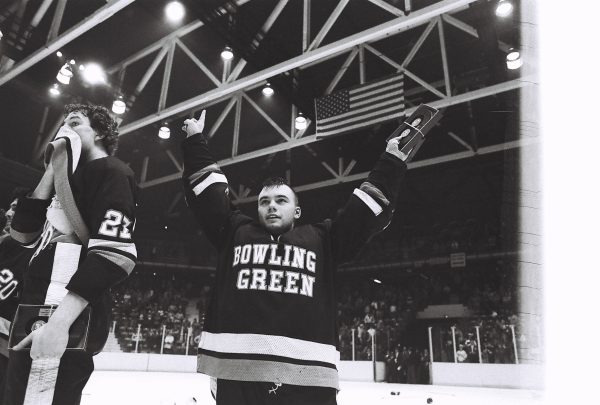
“I think we had a chip on our shoulder. We all felt we deserved to be in and our play throughout the whole year supported that. All the guys coming back had something to prove.”
The rest of the players had similar opinions.
“That one hurt,” said Kane. “We didn’t feel like we deserved a win, we felt like we deserved a shot at one, and that’s what we were denied. It forced us into the 1983 season with a chip on our shoulders.”
Gino Cavallini said, “There was more meaning to making it the second year. We took advantage of what we had in 82-83’. We were snubbed and it drove us to play to higher potential.”
COACH YORK
“Jerry York had come in a year before I got here, and he transformed the program. He turned the corner, and the players he brought in gelled, and we went on some very good runs.”
Pikul had these strong words to say about his four-year head coach and recruiter. Duncan had even better things to say about the man that ran the show.
“I had a great relationship with Jerry. The best coach in college hockey history and one of the best coaches ever. Jerry didn’t like my antics on the ice sometimes with physicality, but I took that as a badge of honor, and he respected the way I played. I would do anything for Jerry.”
“He expected a lot of his players,” said Cavallini. “How to behave and not behave, he was a father figure. I was happy he gave me a chance on a fun team with my brothers.”
Like many coaches, it was not all praise and soft spoken for York. As Cavallini explains, he could be just as hard on you as he could be he could be praiseworthy.
“I think it was the last series in Oxford against Miami of Ohio that we lost a game, it was a terrible performance at a time of the year when we had to win. “I thought to myself, ‘We are walking home.’ I had never seen Coach York that mad, deservingly so.
DAVE STACEY
One of the most incredible stories about the season isn’t about one of the players or any of the paid coaches, but a cut player volunteering to still benefit the orange and brown.
“I was a walk-on for the BG hockey team, and I was cut on a Tuesday in the 82-83 season. On the Thursday of the same week, Coach York discussed my interest in being the strength coach for the hockey team.
“I had graded out the best physically in the tryout, so he asked if I had the willingness to do the program with the guys to keep them in shape during the season.”
“So, I said yes, and I became his first-ever strength and conditioning coach in BG hockey.”
In completely volunteer fashion, Stacey was invaluable to the team, training players who would eventually use his strength in a four-overtime championship game in Lake Placid.
“They were strong and able to hang in games,” said Stacey. “They didn’t run out of gas and had the strength and stamina to do what the guys did.”
York had struck golf with his first-ever strength coach. Stacey’s regiment was far ahead of his time, designing workouts for different positions based on his knowledge of the game.
“Forwards had to be stronger on the pull because they are pulling the puck in towards themselves. We focused on exercises that pulled weight, so they were stronger in the areas they did the most often.
“Defensemen have to be stronger close and in pushing motions. We made the defense do workouts that oriented around pushing motions and they excelled at the pushing parts of the game.”
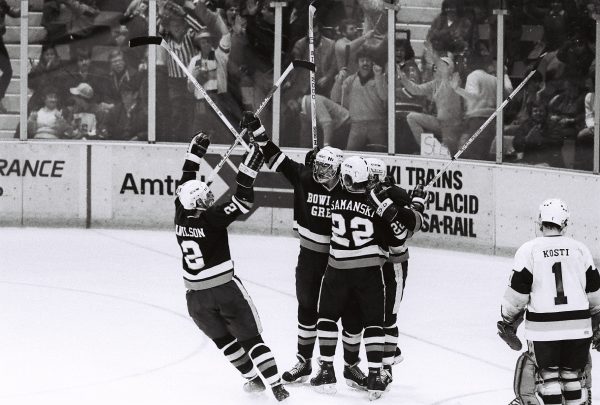
“I looked at it logically and from the standpoint of a player. You have to train for what you are doing. There is no blanket over all players and their strengths and weaknesses.”
Stacey’s work with the team was not unbeknownst to other teams, most notably Bill O’Flaherty and Clarkson University.
“I heard their head coach (O’Flaherty) getting interviewed,” said Stacey. “He said ‘This team (Bowling Green) is the most physically dominating I have seen in years. It is going to take us six weeks to recover from this game. We might need an ambulance to take us back home tonight.”
O CAPTAINS! MY CAPTAINS!
The captains of the 1983-84 season were raved on by York and the players. Defensemen Mike Pikul and Wayne Wilson were cornerstones of the play and the leadership of the Falcons.
“We had two great captains in ‘Pik’ and ‘Wils,’” said Kane. “They were the right guys to choose, and they were great. They could get on us sometimes, but they would have a good time with us as well.”
“They were great teammates and great leaders. They might not have been the oldest on the team, but it was a time when their ability mattered,” said Cavallini.
The two played on the same defensive line, and worked extraordinarily well together, bettering themselves and the team in the process.
‘We (Pikul and Wilson) played together for four years, and we became friends. We played differently, we communicated differently, and being co-captains helped assist in communication and motivation.”
A BAND OF BROTHERS
When I spoke to the players, their connection with each other was sprinkled in every answer they gave. They have an admiration for each other and their relationships, attributing nearly all of their success to someone else or the group.
“Some of these guys I only played with a year, some three or four. The fact that I stayed close friends with those guys tells me what good people they are. We were so close, and they made a big difference in how we played,” said Powers.
“We enjoyed being around each other,” said Kane. “It was a team. We didn’t have any superstars, but we had a team that was super together. We played hard and worked hard, but we did it for the guy beside you, not yourself.”
Cavallini says that the team “knew what our roles were and we knew where we needed to be for each other. We were a great close-knit team and we grinded together. Everyone was a part of everything we did. It took an army and that’s what we were—an army.”
Even today, the team remains close. When setting up interviews for this article, I first found Pikul, who after one email blast to the group of guys connected me with seven separate players within hours of his message.
O’Brian compared their relationship to other college hockey teams, and how uncharacteristically strong it was.
“Guys here in Boston don’t stay in touch with their teammates and that seems odd to me. We were a unique group in that we all stayed together. We all matured at the same time and kept that through our adult lives, communicating almost weekly to this day.”
THE STARS ALIGNING
There are too many different equations in sports. An extraordinary amount of things need to go right to win even one game. As O’Brian communicates, this holds in the greatest year for Bowling Green hockey.
“Luck is a great thing. How do you put luck into words? There are physical aspects and mental aspects to the game, but there’s a whole dimension we can’t control, and it must go right for even a great team like us to win.”
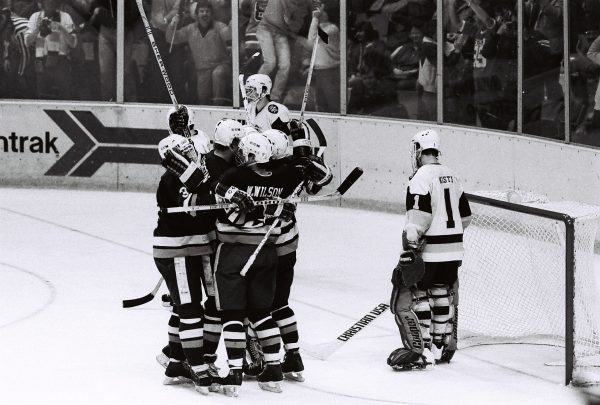
“We got some incredible bounces in the playoffs,” said Cavallini, “especially the final game and you need things like that to win anything. It’s a tough game but I feel like we deserved some of the bounces here and there.”
One goal in particular, the game-tying goal from John Samanski in the final game, was a product of some luck and changed the course of NCAA hockey history. In the final few minutes, an innocent puck was dumped behind the Minnesota-Duluth net, taking a favorable bounce off the door, and finding the stick of Samanski in front of the net.
“You need some luck bounces to win championships. We had a few, especially the Samanski goal. To win, you need a lot of things to go your way and we got the things we needed. They just all came together,” said Powers.
With a dry and targeted phrase, York contributed to why he thought they had such favor.
“We had karma. We spent some karma from the year before and we deserved that too.”
STANDING ON THEIR HEAD
From the phrase “defense wins championships” comes the extreme importance of stopping the puck from going in your net. Goaltender Gary Kruzich did that well.
“When you think of goalies you think of tall rangy guys,” said York. “Kruzich was very small but agile, and Wayne Collins helped him to be better at his craft and the kid learned a lot. He really forced me to keep him in the net down the stretch.”
As the third-string goalie, Powers had much time to observe Kruzich and watch how he performed and grew. He spent more time with the freshman than anyone but second-string Wayne Collins.
“He was as unique a person as you will ever meet. When you just look at him, we don’t look like athletes, but he was. When you put him on the ice his talent level was off the charts. He probably could have skated as a forward or defenseman, that’s how athletic he was.”
The skaters had a very high opinion of Kruzich as well, defending their goalie like it is 1984 again.
“Gary was incredible. Kids now walk in and play the game well all the time. Back then people had to earn their stripes. For him to do what he did as a freshman was insane. He was a hot goalie. He was hot.”
In the semi-finals and finals of the NCAA tournament, Kruzich received two wins and an all-tournament nomination. With some ridiculously acrobatic blocks to save two games, his poise, and athleticism cemented his and the Falcons’ page in the history books.
ELATION
One of the most exciting in that season, the final game was a vivid memory for all the players, coaches, and fans. Almost indescribable, the final play was as outstanding as you might imagine.
“I (O’Brian) was probably the first one off the bench. It was elation. It’s what we were there to do, and we did it. All the things that could have derailed us, and all came together to form a monumental season. It was as energetic as I have never felt in my life.”
“It was pretty exciting,” said Pikul. “I sat at center ice waiting for Gary (Kruzich) to get you there because he was a big part of the win. It was a goal from the beginning of the year. We were confident and we did it.”
The important man, who will not take the credit, is the man who scored the goal himself, Gino Cavallini.
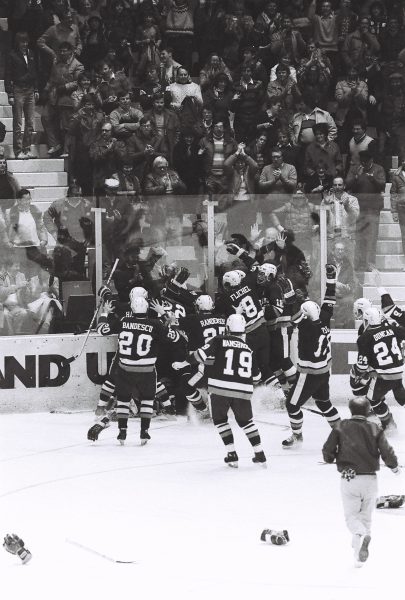
“I remember me laying a big hit, and I remember them taking a good shot and they turned the puck over. We had a fast line of me Kane and Wansbrough and I followed through to the net. I did what I had to do and what I was asked to do, so I fell toward the paint as I always did. There wasn’t anything that was going to stop me from a play I had done a dozen times.
It was elation and exhaustion. It was never about the individual. It was about the effort of all of us tired and barely moving our legs. It was a ‘we and not an ‘I.’ The team was exhausted, and the team was elated.”
For the first time in what would be an unbelievable career, Jerry York had felt what he never had before.
“There is a euphoria that comes with winning the national title, and that adds bond that is instilled on the players and coaches that will last a lifetime.”
RECEPTION
In a fanbase that had been with the team through the snub, a 17-0 win streak, a great rookie year by Kruzich, and the first and only BG hockey national championship, the Falcon fans got even closer to their team, supporting them even after the game was done.
Pikul said, “It was the talk of the university and the town, and I was happy to bring it home.”
“It was incredible,” said Powers. “We were met by the police bringing us into town, and we had a packed arena reception, and we celebrated for what seemed like months.”
“Anything that happened for the following two months was a blur. We were still amped up and to see everyone lined up and ready for us. The community and student body that had been with us all year and waiting to get into the arena to celebrate a last time was insane.” Cavallini loved every second.
York received a more visible reception, being shown great thanks for bringing the winning culture to a small town.
“The neighbors all decorated our houses with the colors and the signs. We pulled in late at night to see the headlights shine on signs that said Ay Ziggy Zoomba in bright orange and brown. It was incredible. BG and the national championship are like one of my kids. While I cannot choose between any of the colleges, college towns, and fans I have interacted with, I love Bowling Green and the Falcons just the same.”
For more stories related to BGSU Athletics, follow Falcon Media Sports Network on X (@bg_fmsn).

